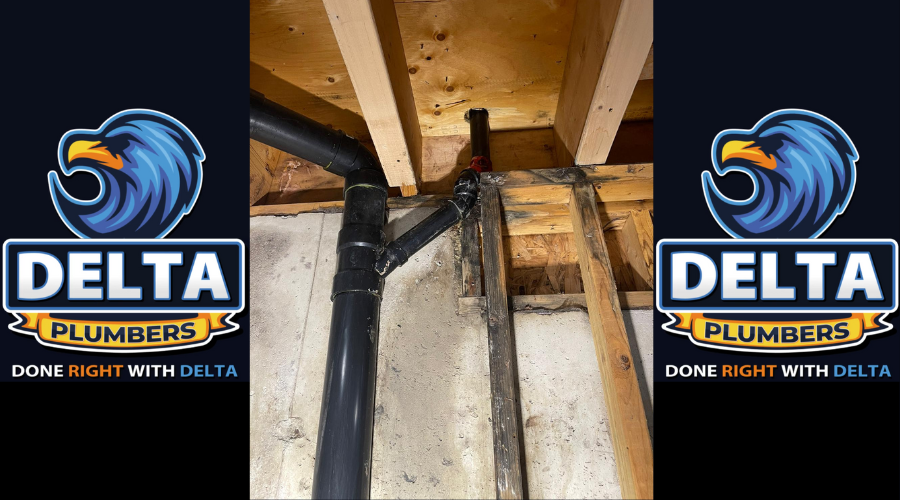Regarding plumbing issues, sewer line problems are among the most frustrating and costly for Toronto homeowners. A damaged or clogged sewer line can lead to backed-up drains, foul odors, and even property damage. If you notice slow drainage, gurgling sounds, or sewage backups, it’s crucial to act fast before the problem worsens.
In this blog, we’ll explore the most common causes of sewer line issues in Toronto, how to recognize early warning signs, and the best DIY and professional solutions to fix them.

Picture Source – Delta Plumbers
Common Causes of Sewer Line Problems in Toronto
Understanding the root causes of sewer issues can help homeowners take preventive measures. Toronto’s aging infrastructure, climate, and environmental factors contribute to many plumbing problems. Here are the most common reasons sewer lines fail:
Aging Pipes
Toronto has many historic neighborhoods, and older homes often have sewer pipes made from clay, cast iron, or even Orangeburg (bitumen-based fiber pipes). These materials degrade over time, leading to cracks, collapses, and corrosion. Aging pipes are especially vulnerable to tree root infiltration and blockages.
Tree Root Infiltration
Toronto is known for its lush urban greenery, but tree roots can be a nightmare for sewer lines. Roots naturally seek out moisture; even a tiny crack in a pipe can attract them. Once inside, they grow and expand, causing severe blockages or even crushing the pipes over time.
Grease and Fat Buildup
Many people don’t realize that pouring grease, fats, and oils down the drain can create major sewer line issues. When grease cools, it solidifies, creating a sticky blockage that traps food particles, hair, and debris. Over time, this leads to slow drains and complete clogs.
Heavy Rainfall and Flooding
Toronto experiences frequent rainstorms and heavy snowfall. Excessive water can overwhelm the municipal sewer system, causing backups in homes. If your sewer pipes are already partially clogged, a heavy downpour can make things worse, leading to basement flooding.
Poor Pipe Installation or Repairs
If sewer pipes are not properly aligned, sloped, or sealed during installation, they can shift over time and create blockages. Improper repairs, such as using low-quality materials or incorrect fittings, can also lead to recurring sewer line failures.
Also Read: Why Ontario Homes Need Special Plumbing Care

Picture Source – Delta Plumbers
Warning Signs of Sewer Line Problems
Catching a sewer problem early can save you from a costly disaster. Here are the telltale signs that your sewer line needs attention:
🚨 Slow Drains in Multiple Fixtures
If only one drain is slow, it’s probably a local clog. But if multiple drains (toilets, sinks, bathtubs) are draining slowly, it’s likely a sewer line blockage.
🚨 Frequent Clogs or Backups
Do you keep plunging the toilet or using drain cleaners without success? A persistent blockage in your main sewer line could be the culprit.
🚨 Gurgling Noises from Drains
If you hear bubbling or gurgling sounds when flushing the toilet or running water, it may indicate a venting or sewer line issue.
🚨 Foul Sewage Odors
A properly functioning sewer system should not smell. If you detect a rotten egg or sewage smell inside or outside your home, you might have a broken sewer pipe.
🚨 Patches of Lush, Soggy Grass
If parts of your lawn are unusually green or wet, even when it hasn’t rained, your sewer line might be leaking underground.
Also Read: The History of Canadian Plumbing: From Ancient Rome to Modern Homes

Picture Source – Delta Plumbers
DIY Steps to Prevent Sewer Line Issues
While some sewer issues require a professional, you can take steps to prevent major problems:
✔ Dispose of grease properly
Instead of pouring grease down the drain, store it in a container and throw it away.
✔ Use drain strainers
These prevent hair, soap scum, and debris from clogging your pipes.
✔ Be mindful of what you flush
Only flush toilet paper—avoid “flushable” wipes, paper towels, and hygiene products.
✔ Schedule regular inspections
A camera sewer inspection every couple of years can detect problems before they become serious.
✔ Plant trees wisely
Keep deep-rooted trees away from your sewer lines to prevent root infiltration.
Also Read: Top 5 Plumbing Issues in Older Homes (and How to Address Them)

Picture Source – Delta Plumbers
Professional Solutions for Sewer Line Repairs
If your sewer line is blocked or damaged, a licensed Toronto plumber can provide several effective solutions:
🔧 Hydro Jetting (High-Pressure Water Cleaning)
A powerful stream of pressurized water blasts through grease, debris, and tree roots, clearing the pipe without damaging it.
🔧 Trenchless Sewer Repair (No-Dig Technology)
Instead of digging up your yard, plumbers can use pipelining (inserting a new pipe inside the old one) or pipe bursting (breaking the old pipe and replacing it with a new one).
🔧 Full Sewer Line Replacement
If your pipes are too damaged, a full replacement might be necessary. Today’s sewer pipes use PVC and HDPE materials, which last much longer than older clay or iron pipes.
Also Read: How to Detect and Fix Hidden Water Leaks in Your Home

Picture Source – Delta Plumbers
How Much Do Sewer Line Repairs Cost in Toronto?
The cost of fixing a sewer line in Toronto varies depending on the severity of the issue:
💰 Basic sewer cleaning: $250 – $600
💰 Camera inspection: $300 – $800
💰 Hydro jetting service: $500 – $1,500
💰 Trenchless sewer repair: $3,000 – $8,000
💰 Full sewer line replacement: $5,000 – $25,000+
It’s best to get multiple quotes before proceeding with a major repair.
Also Read: Tankless Water Heater: Why You Should Upgrade

Picture Source – Delta Plumbers
When to Call a Professional Plumber
You should call a plumber immediately if you experience:
🚨 Sewage backup into sinks or bathtubs
🚨 Strong sewage odors in your home
🚨 Persistent slow drains despite using a plunger
🚨 Multiple plumbing fixtures clogging at the same time
🚨 Flooding or wet spots in your yard
A professional will perform a sewer camera inspection to pinpoint the problem and recommend the best solution.
Also Read: Routine Drain Cleaning: Why it is Essential for Your Home.

Picture Source – Delta Plumbers
Choosing the Right Plumbing Service in Toronto
With so many plumbers available, how do you pick the right one? Follow these tips:
✅ Choose a licensed and insured company
✅ Read online reviews on Google & HomeStars
✅ Ask about warranties on repairs
✅ Compare multiple quotes before hiring
✅ Ensure they offer emergency plumbing services
Conclusion –
Sewer line problems can be stressful and expensive, but with early detection, proper maintenance, and professional repairs, you can avoid major headaches.
If you notice slow drains, foul odors, or frequent clogs, don’t ignore them! Call a trusted Toronto plumber to diagnose and fix the issue before it worsens.
Need help with a sewer problem? Contact a professional plumber in Toronto today! 🚰🏡









